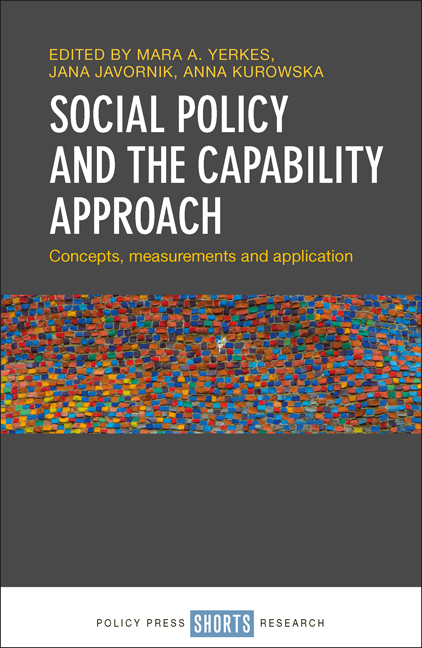Book contents
- Frontmatter
- Contents
- List of figures and tables
- Notes on the editors
- Notes on contributors
- one Rethinking social policy from a capability perspective
- two Education as investment? A comparison of the capability and social investment approaches to education policy
- three From ‘active’ to ‘capable’: a capability framework for policy and practice on ageing and later life
- four Converting shared parental leave into shared parenting: the role of employers and use of litigation by employees in the UK
- five Comparative social policy analysis of parental leave policies through the lens of the capability approach
- six Ask rather than assume: the capability approach in the practitioner setting
- seven Social investment, human rights and capabilities in practice: the case study of family homelessness in Dublin
- eight From the capability approach to capability-based social policy
- Index
two - Education as investment? A comparison of the capability and social investment approaches to education policy
Published online by Cambridge University Press: 30 April 2022
- Frontmatter
- Contents
- List of figures and tables
- Notes on the editors
- Notes on contributors
- one Rethinking social policy from a capability perspective
- two Education as investment? A comparison of the capability and social investment approaches to education policy
- three From ‘active’ to ‘capable’: a capability framework for policy and practice on ageing and later life
- four Converting shared parental leave into shared parenting: the role of employers and use of litigation by employees in the UK
- five Comparative social policy analysis of parental leave policies through the lens of the capability approach
- six Ask rather than assume: the capability approach in the practitioner setting
- seven Social investment, human rights and capabilities in practice: the case study of family homelessness in Dublin
- eight From the capability approach to capability-based social policy
- Index
Summary
Introduction
Social investment represents to date one of the most relevant normative frameworks to think about welfare reform in Europe (for example, Morel et al, 2012a; EC, 2013; Hemerijck, 2018), stressing the positive consequences of social policy in terms of both social and economic outcomes. Indeed, contributing to the health and education of the population, social policy not only improves people's quality of life but also enhances their productivity as workers, thus enhancing economic growth. Hence, one of the central aspects of the social investment strategy involves the focus on improving individuals’ human capital. Indeed, in some versions of social investment, the emphasis on investing in education is pushed so far that it is almost suggested that investments in education can replace social protection and redistribution policies (for a discussion and critique of these positions, see for example, Morel et al, 2012b; Solga, 2014; Deeming and Smyth, 2015). The argument is that once individuals have been equipped for the labour market, they no longer need other forms of social policy because they become self-sufficient and can look after themselves. At any rate, in contemporary debates education policy is considered a key area of social policy that concerns not only children and young people but also all people of working age (through retraining and lifelong learning).
In this chapter we compare the social investment and the capability approaches (CAs) to education policy. In order to understand the role of education policy in social investment we refer to the Communication Rethinking Education: Investing in Skills for Better Socio-economic Outcomes adopted by the European Commission in 2012 (EC, 2012) and cited in the ‘Social Investment Package’ adopted in 2013 (EC, 2013). This Communication suggests that the role of education policy is that of fostering the right skills for the flourishing of the economy. The consequence is that education is mainly interpreted as a means for improving young and older people's productivity as workers. To be sure, fostering people's employability is also a ‘social’ goal: it increases the chances that they can find a good (stable, well-paid, and so on) job in the labour market, thereby enhancing their wellbeing. However, focusing on employability, social investment marginalises other important roles of education: not only its intrinsic value but also its contribution to democratic citizenship through the formation of citizens (Lister, 2003).
- Type
- Chapter
- Information
- Social Policy and the Capability ApproachConcepts, Measurements and Application, pp. 19 - 40Publisher: Bristol University PressPrint publication year: 2019

